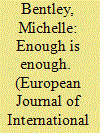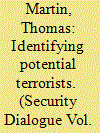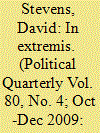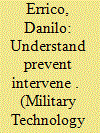|
|
|
Sort Order |
|
|
|
Items / Page
|
|
|
|
|
|
|
| Srl | Item |
| 1 |
ID:
161270


|
|
|
|
|
| Summary/Abstract |
The clash between national security and civil rights comprises one of the most controversial aspects of counter-radicalisation strategy. Analysts present this as a conflict between the need for restrictive security measures (for example, surveillance) and the need to uphold civil liberties (for example, privacy and freedom of speech). In responding to this dilemma, the article examines how this binary normative struggle impacts on the rhetorical presentation of counter-radicalisation policies – in particular, the UK Prevent Strategy and the rhetoric employed by UK Prime Minister and former Home Secretary, Theresa May. It argues that the normative environment has obliged May to construct rhetoric within the context of, what is termed here, normative invalidation. In facing two comparably compelling and related norms of action, May is necessarily required to invalidate or neutralise any norm not adhered to as an essential characteristic of rhetorical strategy. This is discussed in relation to the Strategic Narratives
|
|
|
|
|
|
|
|
|
|
|
|
|
|
|
|
| 2 |
ID:
160449


|
|
|
|
|
| Summary/Abstract |
This article analyses how British counter-radicalization policy in general, and the Channel project in particular, constitute individuals who are vulnerable to radicalization as visible, producing them as subjects of intervention. It thus asks, how can potential terrorists be identified and made knowable? The article first argues that to understand Channel, it is crucial to develop a conceptual account of the security politics of (in)visibilization that draws attention to the ways in which security regimes can, at times, function primarily through the production of regimes of (in)visibility. Using this approach, the article focusses on the role of ‘indicators’ as a technology of (in)visibilization. This role is central to the functioning of Channel, visibilizing certain subjects as threatening. Yet such a production is political. In bringing together a politics of care and a politics of identity, it is a regime of (in)visibility that produces new sites of intervention, contains significant potential consequences for the expression of certain identities, and raises new and troubling possibilities for how contemporary life may be secured.
|
|
|
|
|
|
|
|
|
|
|
|
|
|
|
|
| 3 |
ID:
092645


|
|
|
|
|
| Publication |
2009.
|
| Summary/Abstract |
The main policy reaction to the terrorist attacks of 7/7 and 21/7 of 2005 has been the development of the £6 million 'Preventing Violent Extremism' (PVE) initiative which aims, as part of the government's broader counter-terrorism strategy (CONTEST), to tackle support for, and the promotion of, violent Islamist ideologies within British society. One crucial component of this strategy is providing support for Muslim groups and individuals to tackle radicalisation and extremism directly at the local level. Funding and charitable status for mosques, Muslim community and youth groups and initiatives, 'forums against extremism', anti-extremism 'road shows', and the training of imams are included as part of this strategy. This article argues that this aspect of PVE is not only ill-advised, but potentially deeply counter-productive. It takes issue with two reasons that inform the PVE strategy: first, that what motivates individuals to join extremist groups are the religious ideas themselves; second, that government intervention or involvement is an effective method for rendering the moderate antidote attractive. Arguably, neither of these assumptions is warranted in the face of contrary evidence. Consequently, this arm of PVE is, at best, barking up the wrong tree; at worst, fuelling extremism.
|
|
|
|
|
|
|
|
|
|
|
|
|
|
|
|
| 4 |
ID:
183006


|
|
|
|
|
| Summary/Abstract |
That the distinctions between terrorism and extremism have become increasingly blurred is something of a truism, but there has been little systematic analysis of whether this is truly the case nor of its possible implications. This paper argues that there has been a recent convergence between these two concepts in British parliamentary discourse, reproducing the same signifiers and meanings for non-violent extremism as previously existed for terrorism. In doing so, the paper makes a threefold contribution: methodologically through utilising the underdeveloped approach of post-foundationalist discourse analysis (PFDA) and applying it to the field of terrorism studies; empirically through analysing all the discourse in 1,037 British parliamentary debates between 2010 and 2017; theoretically through drawing together post-foundationalism with Bourdieusian practice theory to show that this transformation of discourse has coincided with social practices of informal criminalization targeting non-violent extremism as if it were terrorism. This has important policy implications as it prescribes particular counter-terrorism practices associated with the hegemonic discourse of terrorism which, when extended to extremism, risk alienating, dehumanizing and motivating the very people deemed to be “at risk” of extremism. The paper illustrates these issues through a discussion of their application in the Prevent Strategy for Higher Education.
|
|
|
|
|
|
|
|
|
|
|
|
|
|
|
|
| 5 |
ID:
086876


|
|
|
|
|
| Publication |
2009.
|
| Summary/Abstract |
Have you ever found yourself in the position of asking, on your own behalf or on behalf of others, how many or precisely which people it would be useful to kill in order to secure a benefit for yourself or your cause? And just how to do it? No? Others have. Their answers have ranged from Cain's original "Abel, with my bare hands" to Hitler's "all the Jews, mainly by gas," and the widespread Hutu view in the Rwanda of 1994, "the Tutsis, with machetes." The question burns today for the government of Sudan and in the Congo.
|
|
|
|
|
|
|
|
|
|
|
|
|
|
|
|
| 6 |
ID:
184135


|
|
|
|
|
| Summary/Abstract |
The work of Louis Althusser is well regarded in the study of ideology, having been used to analyse the material basis for ideology, and challenging the idea that ideology is simply a product of the mind. Recent advances in counterterrorism have seen many states adopting preventative programmes which are non-violent, and nominally voluntary, attempting to deradicalise or steer subjects away from radical ideologies, in an attempt to stem terrorist recruits. Many of these programmes claim not to be ideological. Prevent, which is the UK’s preventative counterterrorism programme, claims not to be ideological, but rather only concerned with stopping extremist ideologies. Using Althusser’s Ideological State Apparatus (ISA) framework, this article explores the ideological and material basis of Prevent, arguing that while Prevent assures us of its non-ideological nature, at its core is a programme that is part of the reproductive ideological apparatus of the state.
|
|
|
|
|
|
|
|
|
|
|
|
|
|
|
|
| 7 |
ID:
172203


|
|
|
|
|
| Summary/Abstract |
The ‘suspect community’ thesis has been a primary tool for exploring counter-terrorism strategies like the UK’s PREVENT and their effect on communities. However, in seeking to shed light on the differentialist, complex nature of modern counter-terrorism, it was recently redesigned by Ragazzi as the ‘suspect category’ thesis. This article engages with this thesis’ concept of distinguished ‘risky’ and ‘trusted’ suspect categories defining PREVENT’s counter-terrorism engagement with Muslim communities. With the author’s own reservations about this thesis, this article also explores this important concept to critically assess PREVENT as a counter-terrorism strategy. Principally, it provides an exploration of PREVENT’s construction of risky and trusted suspect categories and their potential for fostering alienation, as well as a reflection on the effects of alienation on counter-terrorism. These discussions prove that PREVENT fosters alienation that is detrimental to counter-terrorism efforts. Damaging constructions as such not only make PREVENT redundant, but are also emblematic of Jackson’s theory of the epistemological crisis of counter-terrorism, as this article will discuss. Recommendations regarding rethinking the conceptual basis for PREVENT will be also made with a specific emphasis on addressing the epistemological crisis of counter-terrorism.
|
|
|
|
|
|
|
|
|
|
|
|
|
|
|
|
| 8 |
ID:
147129


|
|
|
|
|
|
|
|